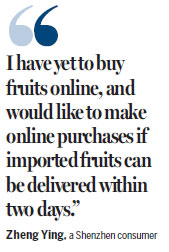Cross-border online business set to pick up with new zones
Updated: 2016-01-13 08:16
By Chai Hua in Shenzhen(HK Edition)
|
|||||||||
The cross-border e-commerce industry is set to scale new heights with Shenzhen, Guangzhou, Shanghai and nine other mainland cities joining Hangzhou in setting up comprehensive e-commerce pilot zones.
Although details of the preferential policies are still under discussion, mainland media reported that fruit, meat and seafood will be categorized as bonded products, which may lead to a 30-percent cut in prices.
Currently, total taxes on US-imported oranges stand at 25 percent - 11 percent import duty and 13 percent value-added tax for agricultural products. Bonded products, however, are levied a 10 percent personal postal articles tax, and are exempted from further taxes if they are priced at less than 500 yuan ($76).
Besides tax incentives, Guangzhou is reported to be providing a more convenient and comprehensive supervision system, reducing customs clearance time and covering storage to delivery.
A Guangzhou official said that under the new setup, it would take only two hours to complete customs checks compared with several days at present, which is of prime importance to cross-border e-commerce companies dealing in fresh food.
In March last year, Hangzhou - the capital of Zhejiang province - became the country's first cross-border e-commerce comprehensive pilot zone, leading to a surge in international business. According to SFB2C - a cross-border logistics service platform operated by Shenzhen-based courier company SF Express - the number of imported goods traded through Hangzhou's pilot zone reached 1.5 million units as of November last year.

The company urged the government to accelerate the establishment of pilot zones and formulate policies to promote the development of cross-border e-commerce and logistics based on current experience.
Shenzhen consumer Zheng Ying said she has yet to buy fruits online, and would like to make online purchases if imported fruits can be delivered within two days. "I normally buy imported fruits at supermarkets, but the prices are usually very high," she said. "So, I usually go for a small amount."
"But the categories of products available at supermarkets are limited," said another consumer Wang Yi. "I had traveled to Taiwan and Thailand and found their fresh fruits very delicious."
As the online market grows, mainland Internet giants have joined the tussle for business, including Tmall and JD.com.
JD.com signed a cooperation agreement with Guangzhou-based Jiangnan Fruit and Vegetable Wholesale Market earlier this week to jointly set up a storehouse in Guangzhou and provide imported fruits, flowers and milk products to mainland clients.
Jiangnan Chairman Ye Canjiang said Guangzhou has a strong base for developing the cross-border e-commerce business, particularly in fresh foods, as the city is a major wholesale market for agricultural products, with imported fruits accounting for about half of the country's total.
He said imported products will be stored in Guangzhou's bonded zone and the General Administration of Quality Supervision, Inspection and Quarantine will examine them onsite, reducing the time for them to get to the customer's table to four days.
Zhou Mo in Shenzhen contributed to the story.
(HK Edition 01/13/2016 page9)